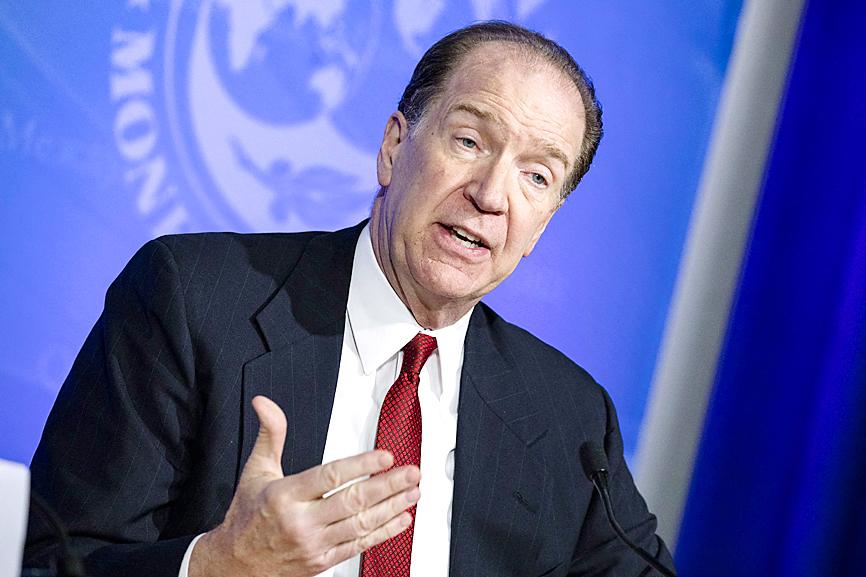Countries around the world are working to diversify their supply chains and reduce their dependence on China, which is “probably good for everyone,” World Bank president David Malpass said on Tuesday.
Speaking at an event in Warsaw, Malpass said that cross-border trade would remain important to the global economy, and China — already the world’s second-largest economy and likely to become the largest — had a big role to play as both a consumer and producer of goods.
VALUE SYSTEM

Photo: AFP
However, China also needed to be part of a value system shared by other countries in the global trading system, he said, adding: “I don’t know that that will happen.”
Asked whether China was headed for a crisis due to severe COVID-19 lockdowns and debt problems in its property sector, Malpass said: “They’re having setbacks, major setbacks in various areas, and the forecasts for growth have been brought down.”
However, he said the World Bank continues to work well with China, which is a major shareholder and a borrower whose use of the lender’s financing is shrinking.
TRANSPARENCY
The bank is also working closely with China to encourage more transparency its lending to developing countries, Malpass said.
“So I guess the way I think of it is that the world needs to interact with China, recognizing that it’s important in the world and growing in importance,” Malpass said.
He also said he did not believe the world faced a new “Bretton Woods moment,” a reference to the 1944 conference that revamped the international financial architecture and created the World Bank and the IMF amid the ruins of World War II.
That system, with the US dollar at its core, “works pretty well,” he added.
“My view is we’re not at that point now at all. There’s not a sense of the world being lost,” Malpass said. “There’s this sense actually of unity of a great deal of the world in one endeavor, which is to end the war in Ukraine.”

SEMICONDUCTORS: The German laser and plasma generator company will expand its local services as its specialized offerings support Taiwan’s semiconductor industries Trumpf SE + Co KG, a global leader in supplying laser technology and plasma generators used in chip production, is expanding its investments in Taiwan in an effort to deeply integrate into the global semiconductor supply chain in the pursuit of growth. The company, headquartered in Ditzingen, Germany, has invested significantly in a newly inaugurated regional technical center for plasma generators in Taoyuan, its latest expansion in Taiwan after being engaged in various industries for more than 25 years. The center, the first of its kind Trumpf built outside Germany, aims to serve customers from Taiwan, Japan, Southeast Asia and South Korea,

Gasoline and diesel prices at domestic fuel stations are to fall NT$0.2 per liter this week, down for a second consecutive week, CPC Corp, Taiwan (台灣中油) and Formosa Petrochemical Corp (台塑石化) announced yesterday. Effective today, gasoline prices at CPC and Formosa stations are to drop to NT$26.4, NT$27.9 and NT$29.9 per liter for 92, 95 and 98-octane unleaded gasoline respectively, the companies said in separate statements. The price of premium diesel is to fall to NT$24.8 per liter at CPC stations and NT$24.6 at Formosa pumps, they said. The price adjustments came even as international crude oil prices rose last week, as traders

Taiwan Semiconductor Manufacturing Co (TSMC, 台積電), which supplies advanced chips to Nvidia Corp and Apple Inc, yesterday reported NT$1.046 trillion (US$33.1 billion) in revenue for last quarter, driven by constantly strong demand for artificial intelligence (AI) chips, falling in the upper end of its forecast. Based on TSMC’s financial guidance, revenue would expand about 22 percent sequentially to the range from US$32.2 billion to US$33.4 billion during the final quarter of 2024, it told investors in October last year. Last year in total, revenue jumped 31.61 percent to NT$3.81 trillion, compared with NT$2.89 trillion generated in the year before, according to

SIZE MATTERS: TSMC started phasing out 8-inch wafer production last year, while Samsung is more aggressively retiring 8-inch capacity, TrendForce said Chipmakers are expected to raise prices of 8-inch wafers by up to 20 percent this year on concern over supply constraints as major contract chipmakers Taiwan Semiconductor Manufacturing Co (TSMC, 台積電) and Samsung Electronics Co gradually retire less advanced wafer capacity, TrendForce Corp (集邦科技) said yesterday. It is the first significant across-the-board price hike since a global semiconductor correction in 2023, the Taipei-based market researcher said in a report. Global 8-inch wafer capacity slid 0.3 percent year-on-year last year, although 8-inch wafer prices still hovered at relatively stable levels throughout the year, TrendForce said. The downward trend is expected to continue this year,